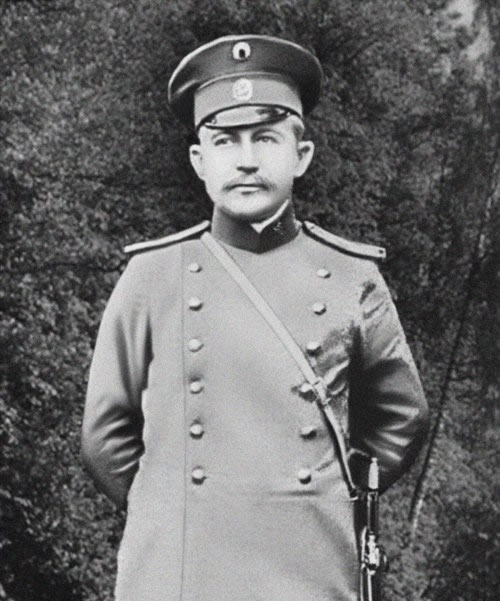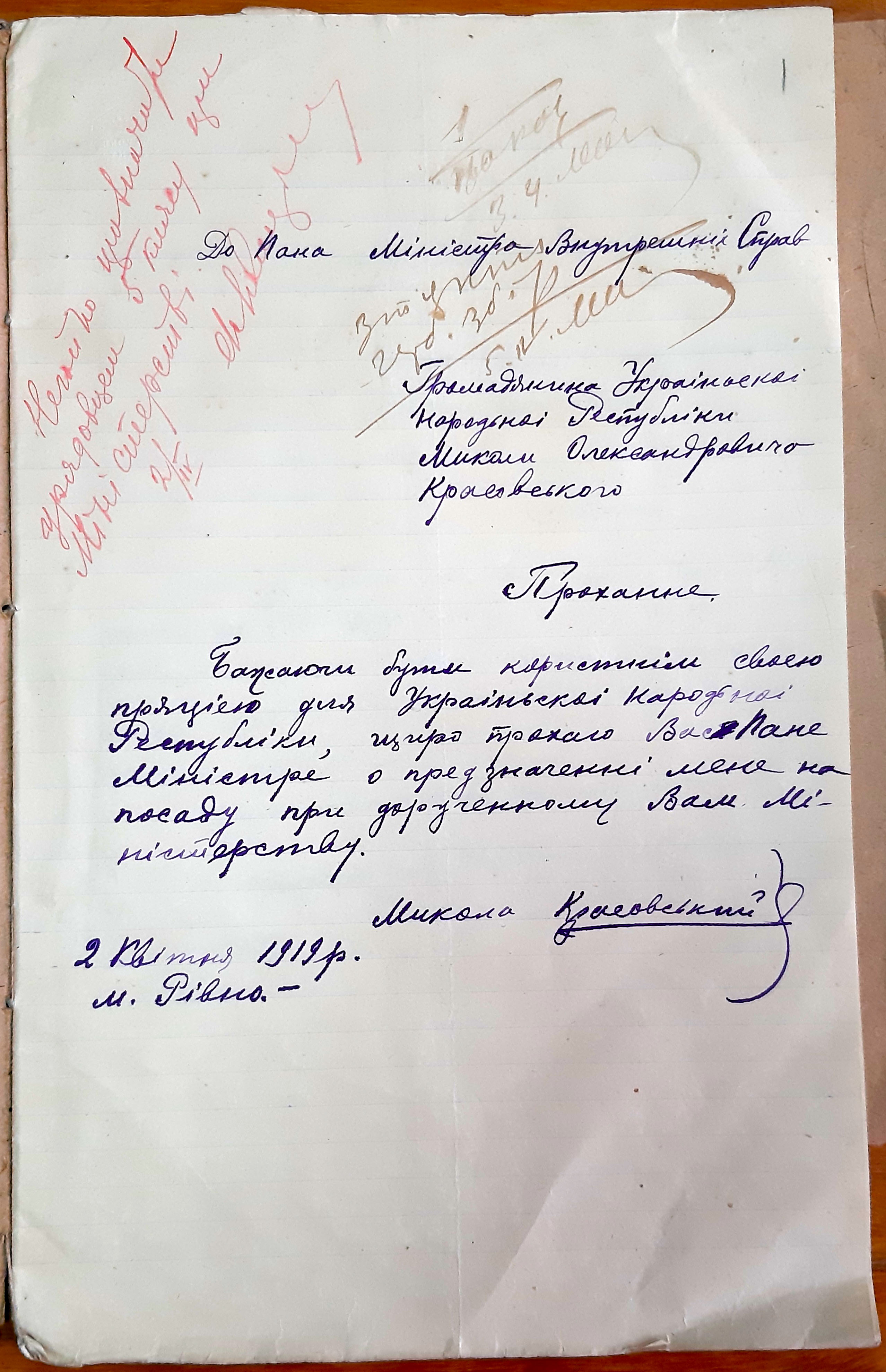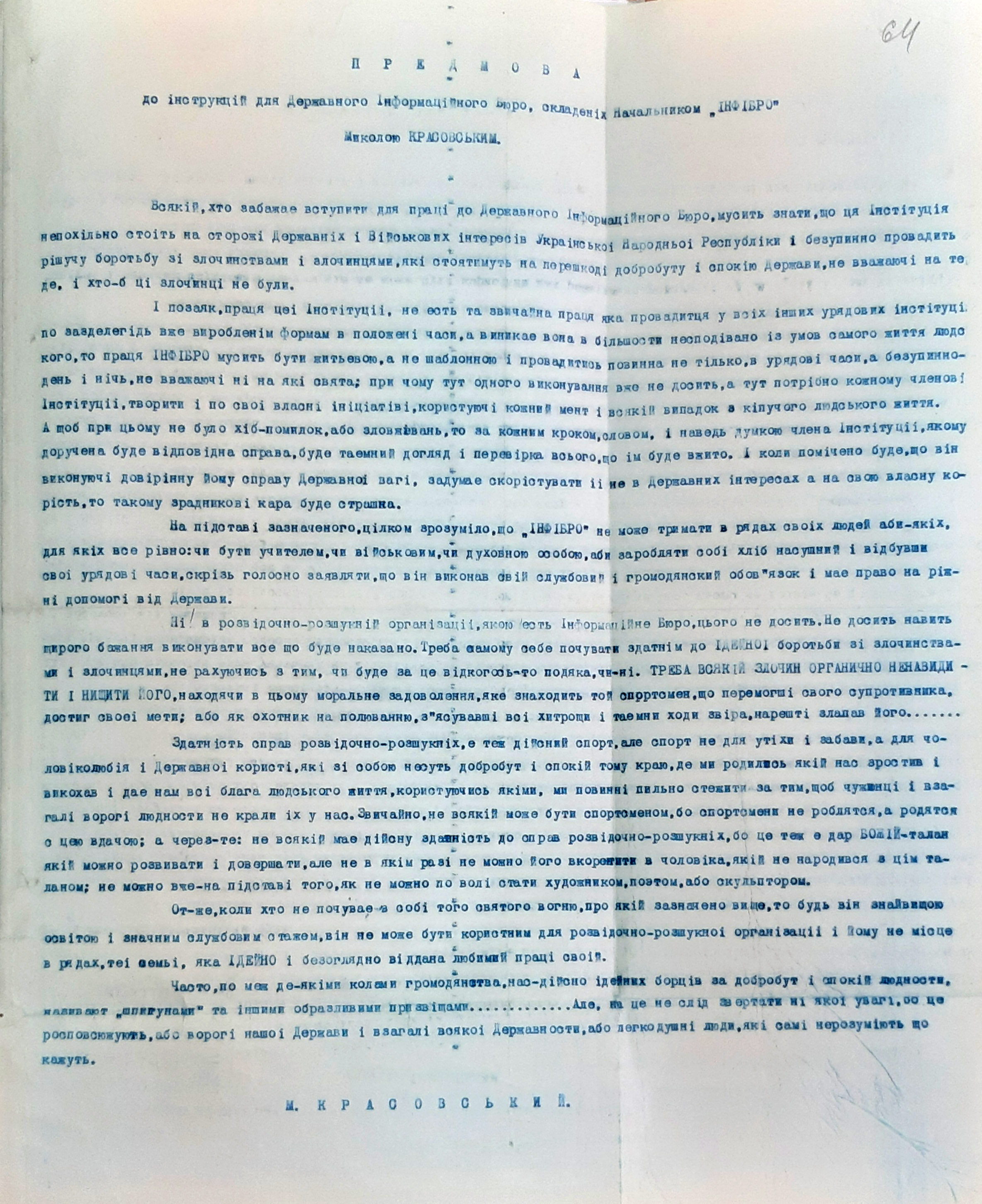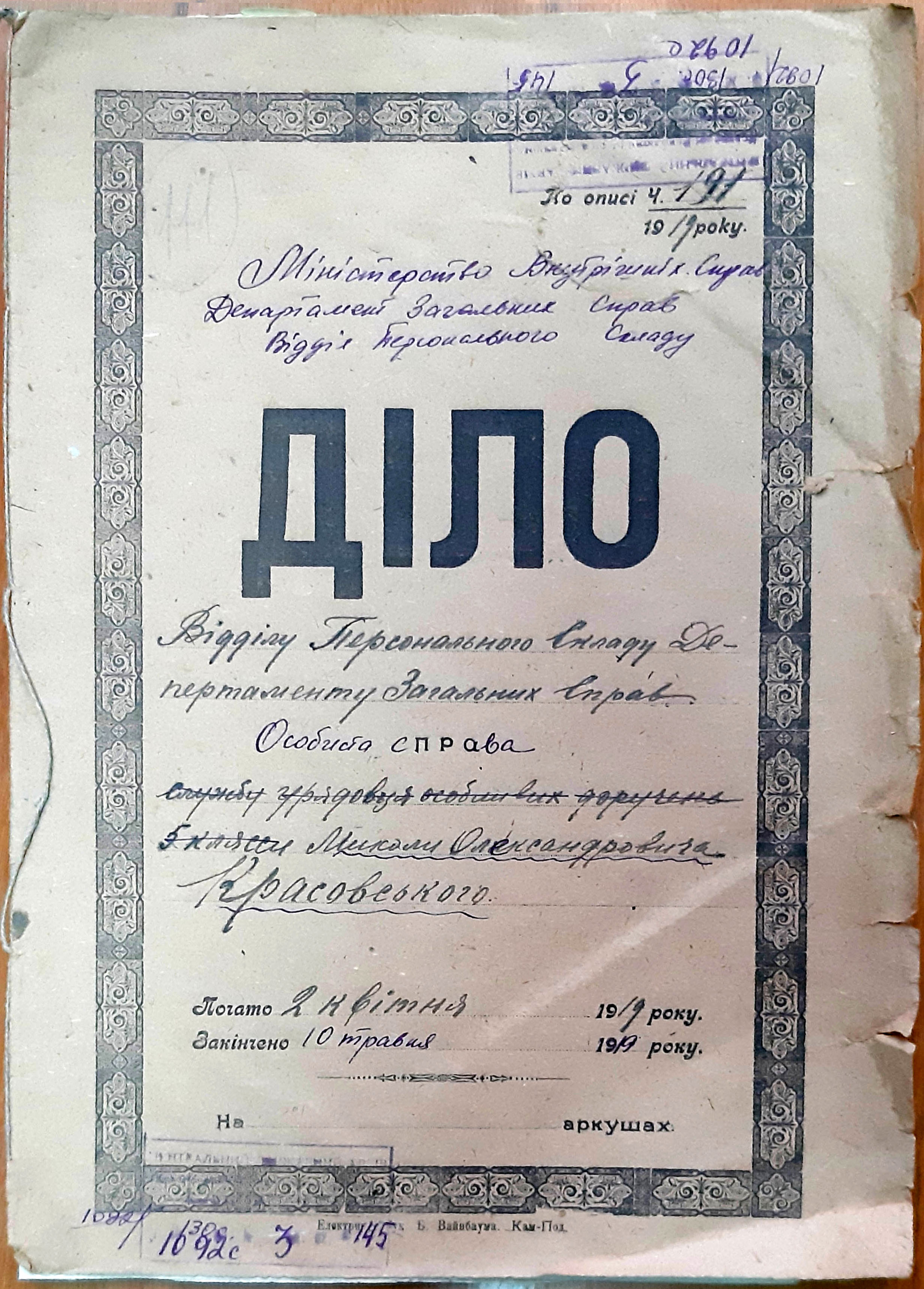Mykola Krasovskyi. A Detective and Intelligence Officer
1/26/2022

The Central State Archive of Higher Authorities of Ukraine(TsDAVO) holds documents of that period that allow to get to know this extraordinary person better, to understand why the detective was appointed to lead intelligence, how he managed within such a short period of time to organize the work so well and achieve such results that the Bolsheviks called the UPR intelligence Petliura’s Cheka, and offered 300,000 rubles for the head of each employee.
Unfortunately, in the documents of the TsDAVO it was not possible to find biographical information about M. Krasovskyi, only official materials dated 1918-1920s. But from other sources it is known that Mykola Oleksandrovych Krasovskyi was born in 1871 in the family of a Kyiv Orthodox priest. He began his career in 1903 as an assistant of a police officer in Nizhyn, Chernihiv province. From 1908 he worked in the Kyiv City Police, for some time he was the Acting Chief of the Criminal Investigation Department (CID).
It was then that he introduced certain innovations in his work, in particular, he tried to be more open and closer to Kyivites. At this, he introduced visiting hours daily from 11 a.m. to 1 p.m. in the premises of the CID at 38, Yaroslavska Street in Podil and, apart from this, in his own apartment at 20, Malovolodymyrska Street (now 21 / 20a, Yaroslaviv Val Street). This fact was even published in the city directory. Kievites willingly visited him because they met with understanding and a desire to come to the rescue.
 In a short period of time, as the Chief of the CID of Kyiv, he solved dozens of high-profile crimes and proved to be one of the best detectives. In the book “Criminal Investigation of Kyiv” he is described as follows: “The criminal world of Kyiv pointed out that Krasovskyi was their serious opponent and they had to beware. Professional criminals of all types and colors understood that Krasovskyi's successful “solvings” were explained by his high professionalism and ability to “work” with agents from their environment... All this caused them concern and at the same time made them think about their safety... One of the thieves’ groups even decided to “remove” Krasovskyi, but this did not intimidate him”.
In a short period of time, as the Chief of the CID of Kyiv, he solved dozens of high-profile crimes and proved to be one of the best detectives. In the book “Criminal Investigation of Kyiv” he is described as follows: “The criminal world of Kyiv pointed out that Krasovskyi was their serious opponent and they had to beware. Professional criminals of all types and colors understood that Krasovskyi's successful “solvings” were explained by his high professionalism and ability to “work” with agents from their environment... All this caused them concern and at the same time made them think about their safety... One of the thieves’ groups even decided to “remove” Krasovskyi, but this did not intimidate him”.
M. Krasovskyi took part in the investigation of one of the most high-profile cases in pre-revolutionary tsarist Russia, which erupted in the world - the so-called “Beilis case” concerning the murder in 1911 of 13-year-old student of Kiev-Sofia Theological Seminary Andriy Yushchynskyi. They tried to accuse of committing the crime Menachem Mendel Beilis, a freight forwarder at the Kyiv Brick Factory, who allegedly committed a ritual murder. Thanks to the persistence of M. Krasovskyi, the real murderers were found and Jewish pogroms in Kyiv were prevented.
At the same time, M. Krasovskyi himself and other detectives who conducted investigations not as they had been instructed to, for their being principled and trying to bring the real culprits to justice, were removed from the investigation. The organizers of the trial, the members of the Black Hundred, did everything in their power to prove Beilis' guilt. But they failed, and he was justified.
December 31, 1911, Mykola Krasovskyi was fired from the police. But despite the political situation, it did not affect his reputation of a true expert. In the following years, he conducted an independent private investigation into this case to bring all perpetrators to justice, and even traveled to the United States for witnesses’ testimonies.
The Ukrainian Central Rada hired M. Krasovskyi as a professional who accepted the idea of national statehood. In March 1917 he was appointed Commissioner of the Criminal Investigation Department of the Kyiv police. He headed the Kyiv CID until June 1918. Under the Hetmanate, he was a member of an underground organization that opposed the presence of Austro-German troops stationed in Ukraine under the Brest Treaty. He was a member of the illegal Rescue Committee of Ukraine. He was arrested and sentenced by a German court-martial to two years in prison.
After Hetman P. Skoropadskyi’s resignation, M. Krasovskyi was released from prison. He worked in the Ministry of Internal Affairs of the Ukrainian People's Republic. From 1920 to 1921 he headed the “Information Bureau” of the Intelligence Directorate of the General Staff of the UPR Army. His handwritten application for employment to the Minister of Internal Affairs of the Ukrainian People's Republic is preserved in the archives. It states: “Wishing to be useful in my work for the Ukrainian People's Republic, I sincerely ask you, Mr. Minister, to appoint me to a position in the Ministry entrusted to you” (TsDAVO of Ukraine. - F. 1092. - Op. 3. - Case 145. - P. 1).
Previously, the Information Bureau (also known as INFIBRO) existed under the Military Gendarmerie Corps. When it was transferred to the Intelligence Directorate of the General Staff in May 1920, it was to become the main working body of Military Intelligence and Counterintelligence of the Armed Forces of the Republic and, in fact, a separate special service. In one of his reports of July 26, 1920, M. Krasovskyi wrote the following about his first steps in his new position: “In April of this year, when the State Institutions of the U.P.R. were being restored in Kamyanets, the Ministry of Military Affairs badly needed an intelligence agency which would address the needs of the reviving army. That is why the Ministry of Military Affairs invited me, as a professional in these matters, to draw up a relevant project and staff. This was done by me immediately, and the necessary draft law on the personnel drawn up on the models existing in all organized foreign states and really meeting all the tasks of both military and political intelligence, was submitted to the Military Council” (TsDAVO of Ukraine. - F 1075. - Op 2. – Case 89. – P. 22).
 Structurally, the Information Bureau consisted of a central body (the INFIBRO Center) and branches of the Center. The central body consisted of departments of internal and external affairs, intelligence and registration. This made it possible to autonomously perform a wide range of tasks on providing intelligence, maintaining the internal security of the Armed Forces, and training the personnel. M. Krasovskyi personally reported to the Chief of the General Staff or the Minister of Military Affairs on the operational situation and the results of the work, which significantly raised his status.
Structurally, the Information Bureau consisted of a central body (the INFIBRO Center) and branches of the Center. The central body consisted of departments of internal and external affairs, intelligence and registration. This made it possible to autonomously perform a wide range of tasks on providing intelligence, maintaining the internal security of the Armed Forces, and training the personnel. M. Krasovskyi personally reported to the Chief of the General Staff or the Minister of Military Affairs on the operational situation and the results of the work, which significantly raised his status.
In the same report, he wrote: “INFIBRO began to send daily reports on everything related to military and political circumstances in the territory of the U.P.R., as well as in neighboring and hostile lands. These reports were received daily by the Chief Otaman, the Head of the Council of Ministers and the Minister of Military Affairs. These top officials were fully satisfied with the INFIBRO reports and, as far as possible, provided the means for this institution to be fully organized so that the latter would be able to carry out its entire program”.
At the head of INFIBRO, Mykola Krasovskyi was notable for his principledness and perseverance, paying great attention to the organization of intelligence work, working with agents who were in the enemy-occupied territory of Ukraine and abroad. He personally developed a number of regulations for the intelligence structure, laying in them his vision of this specific activity and focusing on the features of national intelligence and counterintelligence personnel.
He worked meticulously on instructions for the Information Bureau. He carefully wrote and verified every word and every phrase, remembering his past operational work and his special relations with sources of information. He sought to include in the text the concepts that would reflect the features of character of an operations officer.
The TsDAVO of Ukraine keeps a document entitled “Preface to the Instructions for the State Information Bureau, Compiled by the Chief of INFIBRO Mykola Krasovskyi”. It differs in content from almost all such documents and is unique in terms of formulating the characteristics and demands to an intelligence officer.
The document begins with an address to those who would like to work in this intelligence agency. Emphasis is placed on the fact that this is not an ordinary agency, but a special institution that guards the state and military interests of the Ukrainian People's Republic.
“And since the work of this institution is not the usual work that is done in all other governmental institutions in pre-established forms at the time, but arises most unexpectedly from the conditions of human life itself, the work of INFIBRO must be living, not stereotypical, and should be done not only in work hours but non-stop - day and night, regardless of any holidays; and here performance alone is not enough, here each member of the institution needs to act on his own initiative as well…”
At the same time, M. Krasovskyi emphasized that in order to avoid all sorts of mistakes and abuses, every step, word and even opinion of an employee entrusted with a matter of state importance will be secretly inspected and everything he does will be checked. And when it is noticed that a person tries to act not in the interests of the state, but for his own benefit, “then such a traitor will be punished terribly”.
“INFIBRO”, he wrote, “cannot keep in its ranks any people for whom it does not matter: whether to be a teacher, or a military man, or a clergyman, to earn a living and, having worked his work hours, to declare loudly everywhere that he has fulfilled his official and civic duty and has the right to various benefits from the state...”.
 M. Krasovskyi explained that in intelligence work, even a sincere desire to do everything that is ordered is not enough. One must feel that he is capable of ideological struggle and get moral satisfaction from what has been done. He compared it to the feelings of an athlete who defeated his opponent, or a hunting hunter who, “finding out all the tricks and secret moves of the beast, finally caught him”.
M. Krasovskyi explained that in intelligence work, even a sincere desire to do everything that is ordered is not enough. One must feel that he is capable of ideological struggle and get moral satisfaction from what has been done. He compared it to the feelings of an athlete who defeated his opponent, or a hunting hunter who, “finding out all the tricks and secret moves of the beast, finally caught him”.
At the same time, he stressed that this sport is not for fun or entertainment, but these efforts are necessary for “the state’s benefit, which brings prosperity and peace to the land where we were born, which raised and loved us and gives us all the benefits of human life/ using which we must ensure that strangers and enemies of the people in general do not steal them from us”.
In the end, M. Krasovskyi concludes: “Not everyone can do intelligence work, because it is also a gift from God - a talent that can be developed and perfected, but in no way can it be rooted in a man who was not born with this talent; it is impossible like one cannot become an artist, a poet or a sculptor just because he wants to.
Therefore, if one does not feel the holy fire mentioned above, even if he has the highest education and considerable experience, he cannot be useful to the intelligence organization and he should not be in the ranks of the family that are IDEOLOGICALLY and recklessly devoted to their favorite work” (TsDAVO of Ukraine. - F. 1078. - Op. 2. – Case 70. - P. 64).
 The word ‘ideological” M. Krasovsky deliberately singled out, emphasizing it. He was constantly guided by these provisions in his work and called on his subordinates to do the same. Due to his principled position and determination to defend his own point of view on many issues, he more than once had conflicts with some leaders who were not very well versed not only in delicate issues of operational work, but even in military affairs. There were even cases when they tried to remove him from office, reproaching of his long service under the tsarist regime. At this they demanded from him to provide a report on all persons with whom he maintained intelligence contacts during intelligence missions. In particular, such an order was given to him by the newly appointed head of the Intelligence Directorate of the General Staff, Borys Snigiriv, whom M. Krasovskyi suspected of various abuses and even collaboration with Bolsheviks.
The word ‘ideological” M. Krasovsky deliberately singled out, emphasizing it. He was constantly guided by these provisions in his work and called on his subordinates to do the same. Due to his principled position and determination to defend his own point of view on many issues, he more than once had conflicts with some leaders who were not very well versed not only in delicate issues of operational work, but even in military affairs. There were even cases when they tried to remove him from office, reproaching of his long service under the tsarist regime. At this they demanded from him to provide a report on all persons with whom he maintained intelligence contacts during intelligence missions. In particular, such an order was given to him by the newly appointed head of the Intelligence Directorate of the General Staff, Borys Snigiriv, whom M. Krasovskyi suspected of various abuses and even collaboration with Bolsheviks.
But M. Krasovskyi never went for it and did not reveal the personal operational sources he had acquired during all his years of service. And many of them worked abroad and for many years stayed in touch with him, trusting in every way.
In one of the reports to the leadership of the General Staff, M. Krasovskyi openly wrote about his disagreement with the way some military officials treated the activities of the intelligence body headed by him. At this, he emotionally expressed his inability to compromise with conscience, honor and responsibilities. “My consciousness in matters of intelligence and my ideological struggle against everything criminal and criminals, regardless of their position”, he said, “will only hinder the dreams and desires by which are guided Mister Snigiriv and thousands of foreigners like him, who for almost three years have been destroying and annulling everything that is useful in the Ukrainian Field ”(TsDAVO of Ukraine. - F. 1075. - Op. 2. - Case 89. – P. 23).
After the emigration of the Ukrainian government and military units, INFIBRO operated in Poland for some time. However, in the absence of funds, the unit was later withdrawn from the General Staff of the UPR Army and soon ceased to exist. There is no detailed information about M. Krasovskyi’s life and work in that period. Archival documents only mention that in 1934, a total of 156 people, including Krasovskyi, were detained by the GPU at the Yampil Border Detachment’s section while trying to break into Ukraine with intelligence tasks. Most of them were shot dead.
Therefore, it can be assumed in all probability that the same fate befell the former Chief of Intelligence of the General Staff of the UPR Army.
Only during the independence of Ukraine was his name raised from oblivion. A number of articles and essays were written about Mykola Krasovskyi's life and work, a documentary film was made, an artistic portrait was created, expositions in the museums of the history of national special services are dedicated to him, and in 1990s a memorial plaque was erected on the facade of the house in Kyiv where he lived at the address 21/20a, Yaroslaviv Val.

